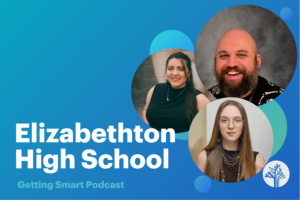David Wiley: Access to Knowledge Initiative, BYU

Dr. David Wiley is Associate Professor of Instructional Psychology and Technology at Brigham Young University, where he also leads the Access to Knowledge Initiative in the David O. McKay School of Education’s Center for the Improvement of Teacher Education and Schooling.
Imagine going to the doctor and the doctor asks you to tell you what is wrong, so that he or she can help you. And you say, “I’m sorry, but out of concern for my privacy, I don’t feel I can reveal that information to you.” When I talked to David Wiley at BYU today, he said that this is basically how the education system currently works.
Students who have individual learning issues, or challenges specific to their performance are left in a critical care limbo because nobody can gain access to the most important features of their learning, the data of their performance.
Wiley cites the opening year of Open High School of Utah as the eye-opening moment that he says proves that having access to data and enabling teachers to make real time adjustments to teaching for learners is what put those students above the average CRT scores for the entire state. And that was, again, in the first year of operation, a time for many new schools that is filled with fitful starts, broken equipment, failed procedures and a steep learning curve.
So, where does the future of learning on the social web and how we use data put us? There are two ways of looking at this, and the one I suggested to Wiley was that perhaps kids who are already finding their learning outside of their classrooms, on peer-to-peer learning modules videotaped and stored on YouTube, or done over instant messenger, may need some sort of approval for all the work they produce there. The other way to look at this is finding ways to allow teachers to use data instantaneously to trim their teaching.
The first way would demand some form of informal credentialing and that would happen if corporations looked for a specific kind of student that created a certain type of work online.
If you are Wal-Mart or IBM and you have three thousand applying for every opening you have, the credentialing of the third party has to be simple enough to really scale. It has to let me quickly filter out according to some criteria that I really care about, to spend time with the three people I really want to spend time calling, or interviewing.
the other way Wiley talked about is letting students actively interact with their textbooks, and even, in some cases, use interactive e-books that they can add to, mixing and fixing as they worked through curriculum. Did you know that students don’t often use their textbooks in this way? That it’s against the rules to highlight and alter the textbooks? I didn’t remember this from my days in high school. We were allowed to highlight in our books.
Wiley says schools should focus more on using open source material, often found on the web, to help students take a more active approach to their learning:
A lot of things are to take the wind out of the argument of saying you can’t have successful larning if you are taking from openly licensed materials. In every instance [of CRT testing at Open High School of Utah] our kids were above average in core areas. In science, our CRT scores were more.”
And then there is the broader philosophical problem that Wiley brought up: why are schools demanding that students be all things to all people, and why make schools all things to all people?
You have seen what happens when you try to be all things to all people, and every school that tries to do all things will be just as unsuccessful as any organization that tries ot do that. We need to get our minds collectively around the idea that we provide opportunities to people to take the path that suits them, based on whatever criteria that suits them.
The problem is that school districts are not sharing the data, or sometimes tracking the data that would enable ultimately successful fixes to every student’s learning issues.
There’s no detail of data and it’s laughable to go to your doctor and not work to provide information to figure out answers to questions to be helpful in the diagnosis of your condition. This is what happens in the education context. I think differentiation is really impotant to helping people…do what they want to do with their lives. I think you will see an increase in this dea that you have to gather more data about you…we need to put it together so we can put together a more accurate diagnosis so we can help you more.
And I found this somewhat related article online today about web-based peer review.





0 Comments
Leave a Comment
Your email address will not be published. All fields are required.